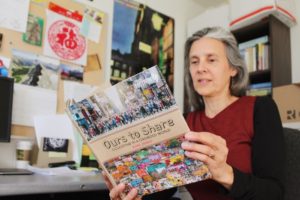Camosun College English instructor Kari Jones recently had her most recent book, Ours to Share: Co-existing in a Crowded World, published by Orca Books. The book, Jones’ seventh, looks at how having almost eight billion people on Earth puts strain on resources. Still, despite the heavy subject, Jones remembers her audience—the book is for ages 9 to 12—and practices what she preaches to her students.
“I try not to talk down to my readers but just to be a little bit more explanatory so they understand what I’m saying,” says Jones. “And that’s what I’m always telling the students: just remember the reader.”

Getting recognized for her work—such as a 2017 nomination for the Bolen Books Children’s Book Prize—is important to Jones, but she emphasizes how rewarding it is to hear feedback from friends after their kids read her books. She particularly enjoys this personal connection with her young readers.
“My cousin told me that her daughter wasn’t really a reader and then she read one of my books and now she wants to read all of my books,” says Jones. “That’s really nice when you realize you’ve had an impact on a child’s life; I think that’s, for me, the biggest thing.”
Jones has had her books translated into several different languages; she laughs at the fact that she can’t read Finnish, for instance, and can only hope that the translation is accurate. Mostly, though, Jones is intrigued by how her work is perceived by readers abroad.
“The one that was translated into most languages is set on the coast here and I don’t know how people in other countries will see it,” she says. “I can really visualize it because I live here, but I just wonder what they see when they read that in another country.”
Jones’ appreciation for various perspectives goes even further, especially in terms of realizing that there are other ways of living. Jones says that this recognition allows for different approaches to some of the crises that we are in; part of that recognition is acknowledging privilege.
“We need to understand that privilege has a responsibility that goes along with it, which is to care for the world and to care for people who are less privileged than ourselves,” she says, “and maybe even sometimes to give up some of our privileges.”
Acknowledging privilege relates to the concept of sharing and big-picture thinking that Jones discusses in Ours to Share.
“I think if we go into the world thinking about sharing then we are less likely to try to protect our own little spot,” she says. “We are more likely to think about the world as a large place that we all need to participate in.”
Jones says that anybody can be successful when there is passion and a lot of commitment involved. She is inspired by young activists such as Greta Thunberg and Jones’ friend Mira, to whom she dedicates Ours to Share. Mira is a 15-year-old girl who has been involved with trying to get the voting age lowered in British Columbia.
“I think if you just have the idea and the commitment you can really make a difference,” says Jones. “That’s really the message that I hope that young people reading the book would go away [with]—if you want to change something, you can work for that.”
